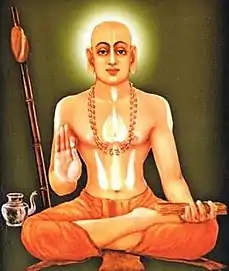Ashta Mathas of Udupi
The Tulu Ashta Mathas of Udupi (ಉಡುಪಿಯ ತುಳು ಅಷ್ಟ ಮಠಗಳು) are a group of eight mathas or Hindu monasteries established by Madhvacharya, the preceptor of the Dvaita school of Hindu thought. For each of the eight mathas, Madhvacharya also appointed one of his direct disciples to be the first Swami, head of the matha.
| Matha | First Sannyasi | Presiding Deity | Reigning Pontiff | Successor |
| Pejavara | Sri Adhokshaja Teertha | Vitthala with consorts Sri and Bhudevi | Sri Vishvaprasanna Teertha Swamiji | |
| Palimaru | Sri Hrishikesha Teertha | Kodanda Rama with consort Sita and brother Lakshmana | Sri Vidhyadeesha Teertha Swamiji | Sri Vidyarajeshwara theertha Swamiji |
| Adamaru | Sri Narasimha Teertha | Kaliyamardana Krishna with four arms | Sri Vishvapriya Teertha Swamiji | Sri Eeshapriya Teertha |
| Puttige | Sri Upendra Teertha | Vitthala with consorts Rukmini and Satyabhama | Sri Sugunendra Teertha Swamiji | Sri Sushreendra Teertha Swamiji |
| Sodhe | Sri Vishnu Teertha Swamiji | Bhuvaraha | Sri Vishvavallabha Teertha Swamiji | |
| Kaniyooru | Sri Rama Teertha Swamiji | Yoga-Narasimha | Sri Vidyavallabha Teertha Swamiji | |
| Shirur | Sri Vamana Teertha Swamiji | Vitthala (called "Vamana Vitthala" to differentiate from Pejavara icon) with consorts Sri and Bhudevi | Sri Lakshmivara Teertha Swamiji (deceased) | |
| Krishnapura | Sri Janardhana Teertha Swamiji | Kaliyamardana Krishna | Sri Vidyasagara Teertha Swamiji | |
| Part of a series on |
| Hinduism |
|---|
 |
|
| Part of a series on |
| Dvaita |
|---|
 |
| Hinduism portal |
The ashta mathas are named after the villages in which they were originally located. Today, the mathas are situated in the temple town of Udupi. The mathas work to propagate the Dvaita philosophy. They also administer the famous Udupi Krishna Temple by way of a formal rotation scheme called Paryaya.
When the ashta mathas were formed, Sri Madhvacharya initiated the Swamijis of the mathas in pairs. Each pair of mathas is called Dwandva (literally, two or dual). In the event the current Paryaya Swamiji has difficulty performing his duties, the Swamiji from the Dwandwa matha takes over the responsibility. The four pairs of mathas are: Palimaru and Adamaru; Krishnapura and Puttige; Shirur and Sodhe; and Kaniyooru and Pejavara.
See also
External links
- Sri Puthige Matha
- Sri Pejavara Adhokshaja Matha
- Sri Adamaru Matha
- Sri Palimaru Matha
- Sri Kaniyooru Matha